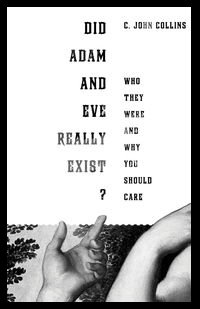
C. John Collins
Reviewed by: Chad E. Bond
Did Adam and Eve Really Exist? Who They Were and Why You Should Care, by C. John Collins. Published by Crossway, 2011. Paperback, 192 pages, list price $15.99. Reviewed by OP pastor Chad E. Bond.
C. John Collins has already published several studies on the interpretation of Genesis and the relationship between science and theology. His goal in this book is to demonstrate that the traditional understanding of Adam and Eve is worthy of our confidence and to show why it must be retained.
We know that Adam and Eve really did exist, because the Bible tells us so. But next time someone tells you he could never be a Christian because Genesis 1–3 poses a serious intellectual stumbling block, will you be prepared to make a defense? Next time someone attacks your belief in a literal Adam and Eve with sophisticated scientific counterclaims, will your confidence be shaken? Did Adam and Eve Really Exist? is a valuable resource for anyone interested in reflecting further upon this important subject.
Collins painstakingly expounds passages in Scripture that speak of Adam and Eve, demonstrating that the traditional understanding of our first parents is the view articulated or presupposed in Genesis, by Paul, and above all by Jesus in the Gospels. These texts require a historical Adam and Eve for their "truth value." Collins also shows how these texts are part of the overarching, worldview-shaping story of creation, fall, redemption, and consummation. It is necessary, Collins insists, to appreciate the way in which the traditional understanding of Adam and Eve is an "irremovable" part of the Bible, underlying and controlling the entire story line from Genesis to Revelation.
Collins goes on to show how the traditional understanding of Adam and Eve provides a meaningful explanation for everyday moral and religious experience (e.g., the recognition of human uniqueness and dignity, the sense that something is wrong with us, the yearning for justice, and the hunger for things to be better). The only satisfying explanation is the one given in the Bible, which enables believers to affirm and understand these intuitions.
Finally, how should we think about Genesis and science? What about current theories on the origin of the human race? Collins deals with these and related questions in chapter 5. His tone is tentative and latitudinarian. His proposed "bounds of sound thinking" are broad and inclusive. In the end, we are left with "many uncertainties." But these uncertainties, Collins reassures us, "in no way undermine our right to hold fast to the Biblical story line with full confidence."
In sum, current scientific evidence does not require us to abandon a historical Adam and Eve. Making sense of the world and human experience requires a historical Adam and Eve. And, above all, making sense of the biblical narrative requires a historical Adam and Eve. Collins presents a compelling case for these conclusions. At particular points along the way, readers are likely to find room for disagreement with his argument. I certainly did. But, as Bunyan once wrote, "None throws away the apple for the core." Therefore, to the extent that this scholarly study inspires confidence in the traditional understanding of Adam and Eve, we owe Collins a debt of gratitude.
November 09, 2025
November 02, 2025
October 26, 2025
October 19, 2025
October 05, 2025
Raising Sexually Faithful Kids and
Parenting Boys and Girls in a Gender-Confused World
September 28, 2025
Calvin’s Ecclesiology: A Study in the History of Doctrine
September 21, 2025
© 2025 The Orthodox Presbyterian Church